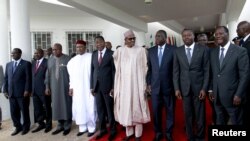A senior official at the Economic Community of West African States (ECOWAS) says other regional organizations can learn from the policies the West African grouping has been implementing to combat violent extremism in Africa.
Remi Ajibewa, ECOWAS director for political affairs, says member countries within the region have been collaborating, sharing intelligence and information, as part of an effort to combat terrorism in the sub-region. The Nigeria based Islamist group, Boko Haram, has been carrying out cross border violence in Nigeria, Niger, Chad and Cameroon, creating a challenge for member countries in the region. The violence has affected socio-economic activities in areas the militants attack.
Ajibewa’s comments came after terrorists attacked a hotel in Mali’s capital, Bamako, less than two weeks ago.
But, speaking on a United Nations panel on violent extremism in New York, Ajibewa said ECOWAS has a rich body of experience in countering extreme violence in the region through its counterterrorism strategy.
This, he said, includes counterterrorism strategic level training at both national and regional levels, and strengthening and harmonizing legal frameworks in member countries. Ajibewa also says all members of ECOWAS have established financial intelligence units to control flow of cash in the region and to monitor illicit financial transactions that help the militants carry out their violent activities in the region.
He says there is a need to focus on the root cause of terrorism. Ajibewa adds that ECOWAS’ conflict prevention framework, which was adopted by heads of state and governments in the region, seeks to help resolve issues that could often lead to violent extremism.
“It includes early warning, preventive diplomacy, disarmament, peace and development, and it also involves the ECOWAS standby force, education and democracy," he said.
Learning from other countries
Ajibewa says Nigeria, a member country, has developed a national violent extremism program he described as a soft approach to raising awareness of the threat of violent extremism as well as shaping policy and programming.
According to Ajibewa, the root causes of extremism are inequality and "the grievances...[of] people who believe that they have been marginalized."
He says the Nigerian program not only aims to reintegrate victims but also those who have left the terrorist enclave.
Ajibewa says ECOWAS is cooperating with the neighboring regional bloc, Economic Community of Central African States (ECCAS) in the fight against Boko Haram and other violent extremists groups.
“Their member states share information with the ECOWAS region. Not only sharing intelligence reports, they also communicate and do what we call lessons learned so that we will all be able to improve. And that is why we have the multi-international task force which has been assisting in that area,” he said.




